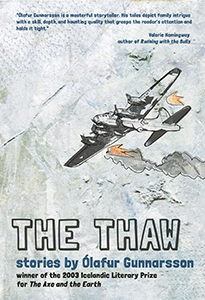The Thaw
Deceptively simple stories explore the joys and tragedies of being human.
The Thaw, by award-winning Icelandic author Ólafur Gunnarsson, explores the human psyche in an incisive collection of short stories translated into English. In spare, minimalist prose, the author documents both the joys and tragedies of being human while exploring such diverse themes as aging, terminal illness, rivalry, and what is real.
In “Alien,” a man left with one of his daughters for the weekend ends up watching the movie of the same name starring Sigourney Weaver. While he and his three-year-old daughter talk about the film in simplistic banalities, the reader questions the wisdom of a parent that would let a toddler watch such a terrifying fictional film. With a master twist, however, banality becomes terror as the man proposes a frightening suggestion to his daughter.
The brilliant juxtaposition of the quotidian and the grotesque appears again in the titular story. An aggressive older brother and his meek younger one live together while the younger stews in quiet resentment. When a woman comes between the two, an unexpected violent event results. In his economy of language and ability to create disturbing scenes with simplicity, Gunnarsson’s writing in this collection recalls that of Shirley Jackson’s “The Lottery,” a similarly deceptively simple story about the repetition of human sacrifice in a modern rural town.
In addition to contrasting the everyday and the outlandish, the author samples elements of magical realism. In “Killer Whale,” an orca appears out of nowhere, emphasizing the author’s ability to inject magical realism into his stories while simultaneously breathing new life into the usually trite trope of the deus ex machina.
For all its thought-provoking content, the translation is uneven: “The nurse was tending to the child tenderly,” could have been rendered using a verb and an adjective that do not share the same root, for example. Likewise, it would be unlikely that a seven-year-old character would refer to his class art display as an “exhibition.” However, at other times, the translation fits with the story and showcases the author’s way with words, as in this description of an airplane accident: “And like a black goose that had been shot, the enormous plane crash-landed on the gravel airfield.” Or this ironic phrase that expresses a role reversal of a father and his terminally ill daughter: “[She] sat there in her wheelchair like a solemn old woman expressing her approval of her well-behaved grandson.”
Overall, in this elegant collection, Gunnarsson’s stories succeed.
Reviewed by
Jill Allen
Disclosure: This article is not an endorsement, but a review. The publisher of this book provided free copies of the book to have their book reviewed by a professional reviewer. No fee was paid by the publisher for this review. Foreword Reviews only recommends books that we love. Foreword Magazine, Inc. is disclosing this in accordance with the Federal Trade Commission’s 16 CFR, Part 255.

